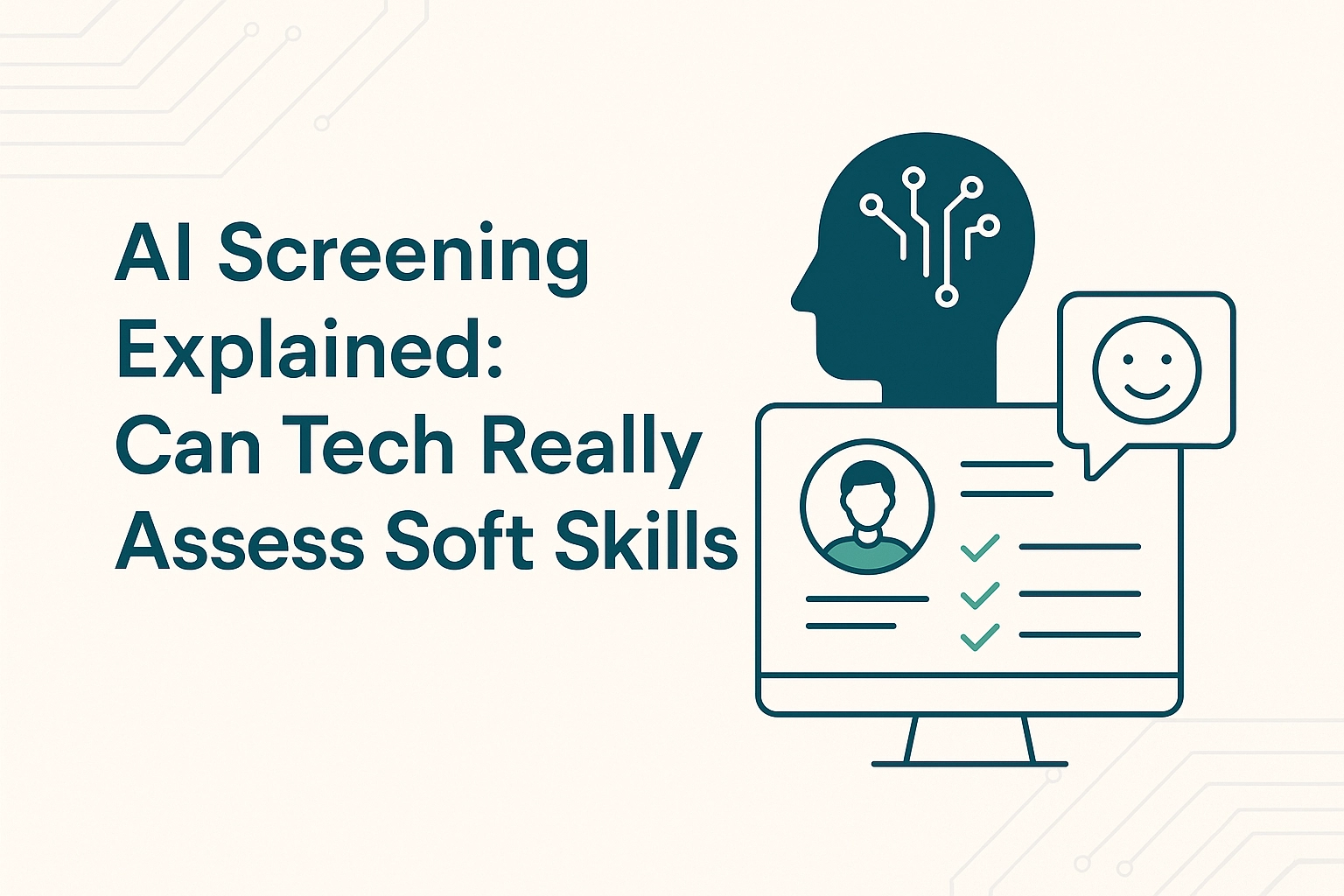AI Screening Explained: Can Tech Really Assess Soft Skills?
TL;DRAI screening is increasingly used to evaluate candidates at scale but its ability to measure soft skills remains controversial. While early models relied on flawed assumptions, today’s best systems can identify communication styles, behavioural traits, and even emotional nuance. But the key lies in how the AI is designed, tested, and governed. With the right guardrails, soft skill screening through AI can be both effective and fair.
Why Soft Skills Matter and Why They’re Hard to Measure
Soft skills are no longer just “nice to have.” In a 2024 report from McKinsey, 72% of business leaders cited communication, adaptability, and emotional intelligence as more predictive of long-term success than technical knowledge alone. Yet traditional hiring methods struggle to capture these attributes objectively.Structured interviews help to some extent, but interviewer bias, inconsistency, and time constraints often make them unreliable. And resumes rarely convey how someone handles feedback, collaborates under pressure, or de-escalates conflict.This is the space where AI screening has emerged: promising to evaluate these intangible qualities with consistency and scale.How AI Screens for Soft Skills Today
Modern AI screening tools use a mix of natural language processing (NLP), audio analysis, and behavioural science to infer personality traits from candidate interviews – typically one-way video responses.A candidate’s word choice, sentence structure, speech cadence, and even pause length can all become data points. Rather than looking for “right” answers, these systems model responses against behavioural frameworks like the Big Five personality traits or DISC assessments.Some platforms go further – attempting to detect confidence, empathy, or emotional regulation from tone and microexpressions. Others score alignment to company values or role-specific competencies using thousands of prior interview data points.While this might sound speculative, the field is evolving rapidly – and the data is starting to catch up.What the Research Actually Shows
Multiple peer-reviewed studies have begun to unpack whether AI can meaningfully assess soft skills.A 2023 meta-analysis published in the Journal of Applied Psychology found that AI-based assessments using structured video interviews correlated moderately with job performance across sales, customer service, and support roles. The strongest correlations were with traits like verbal communication, resilience, and conscientiousness.In a 2022 study by the Technical University of Munich, researchers tested an AI model designed to measure extraversion and agreeableness from speech. Their results showed that the AI outperformed human recruiters in consistency of scoring, particularly when reviewing large candidate volumes.However, the same study warned that performance dropped when language fluency varied – particularly for candidates with strong accents or non-native English proficiency.This is a common pattern. The tools work best when candidates fit the dataset the AI was trained on – and this is where ethical concerns arise.Bias, Transparency, and the Risk of False Confidence
The most serious challenge facing AI screening is bias. If an algorithm has been trained on historical hiring decisions (many of which carry unspoken biases) then it may learn to prioritise those same patterns. This can lead to discrimination based on gender, race, age, or neurodiversity, even when the input data seems neutral.Check out our Is AI in Hiring Biased Webinar with Torin EllisA 2024 white paper by the Centre for Democracy & Technology outlined specific risks in emotion detection AI. Their conclusion: attempts to infer emotion from facial expression or tone are unreliable across cultural and neurological differences – and should not be used without rigorous scientific backing.It’s also worth noting that some AI vendors have marketed capabilities that lack peer-reviewed validation. In 2021, a joint statement from over 200 AI ethics researchers called for increased regulation of AI hiring tools, demanding scientific transparency in performance claims.
Check out our Legal Guide to AI Hiring with Leading Law Firm Mishcon De ReyaThis doesn’t mean AI screening can’t assess soft skills. It means the tools need to be held to the same evidence-based standards as any other assessment method.
What “Good” Looks Like: Evidence-Based AI in Hiring
When done right, AI screening can help identify soft skills that would otherwise be missed – or inconsistently judged.To get there, developers and employers must follow several principles:- Use AI models that are grounded in validated behavioural science, not black-box scoring.
- Ensure that training data includes diverse demographics, speech patterns, and communication styles.
- Regularly audit outputs to check for disparate impact across groups.
- Combine AI scoring with human judgment – particularly for borderline cases or sensitive traits.









